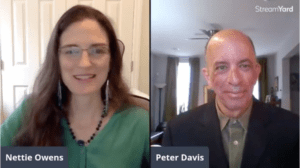What is the experience economy?
I didn’t invent the term “experience economy.” There’s a book called “The Experience Economy,” and the basic idea is that in the past, we had an economy based on commodities. Then we experienced the Industrial Revolution, and we started to focus on products. Now we’ve switched to services. And the experience economy takes it a step further.
It’s not commodities. It’s not about the product or the object that you sell. It’s not even about the service that you sell. It’s about the experience that you’re providing.
The pinnacle example of this is Disney. Anybody who’s ever been to Disneyland or Disney World or encountered Disney at all understands that Disney is not just about products or services; it’s about the entire experience that they provide for their customers.
So, the basic idea is that no matter what your business is, realize that what we’re actually selling is the experience. And our customers want transformative experiences. This is something we need to realize now, and no matter what the future brings, that’s something that we need to always be paying attention to – no matter what our business is.
“Have you put any thought into the experience you are providing for your customers? While initially, you might be able to provide them a product or service they need, eventually, that will not be enough with the number of choices that consumers have available.”
Why is it important right now for a business to be aware of the experience they are creating for their customers?
Most people have had it drilled into their head that you’re not supposed to be selling features; you’re supposed to be selling benefits. And that means explaining what you do and if it’s a product, to explain the benefits to the customer.
Now we’re moving to selling the experience. And while I don’t know that it’s more important than ever – it definitely has applications today.
We have two major crises happening at this moment. One is COVID-19, and the other that is happening has to do with the riots, the police, and the political world. So, every business needs to consider how these are going to affect their clients.
When you’re working with your current customers or trying to attract new customers, you have to think about the fears, the concerns, and the problems that your customers have. And if you’re not thinking about those things, then you’re not thinking about how they’re affected by COVID-19 or how they’re affected by the political unrest that is occurring right now.
“Your clients and customers are greatly affected by the things happening outside of your business. Have you thought about this as you interact with clients? Have you tied it to the experience you are creating for them?”
How do they communicate their story through the experience they provide?
You have examples of businesses who have destroyed or ruined their business because their owner or CEO makes some stupid joke on Twitter. They think it’s funny, but it can ruin their business.
This isn’t just about pretending that you care. It is about being aware of how your actions affect people, how they’re going to affect your business, and realizing that that is all part of what your business is about.
The current atmosphere and your actions are going to affect how people see your business. It’s going to affect the character of your business and how you’re perceived. And how you respond in these kinds of situations matters to people. Or, if you fail to respond, that also matters to people, and they will notice it.
Nobody gets to pretend that they don’t have to care about these things. You have to take some sort of action.
“The experience goes beyond the experience you’re creating for your customers, clients, and employees. You also need to consider the experience that they’re having in the larger world and how your company fits into that puzzle.”
3 Action Steps
- Establish the experience that you are trying to bring to your customers.
- Be aware of fears, concerns, and problems that your customers are facing, so you know how they affect your customers.
- Create a response to the concerns and problems that shows you care about what your clients are facing..
Connect with Nathan Willard at nathanwillard@ethosbusinessguide.com
Please comment below. I would love to hear from you.














No comments yet.